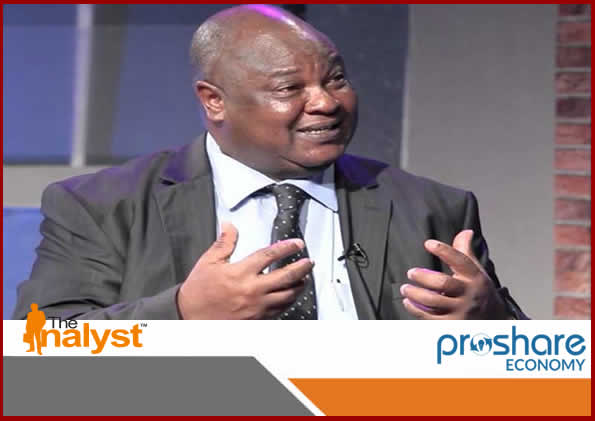Tuesday,December 17, 2019 /06:30 PM / By Adesola Borokinni, Proshare Research / Header Image Credit: BRTNEWS
Dr.Ayo Teriba at a one day conference on the economy, noted that for the countryto navigate along a sustainable and stable track in 2020, it must improvefiscal liquidity. The conference was divided into four sessions with subjectmatters ranging from global risks, economic risks, policy risks andopportunities.
Riding The Global Liquidity Glut
Thefirst session, addressed issues or concerns regarding present global realities.Dr. Teriba observed that hinging economic growth on the export of primary commoditiesis a trend that is slowly disappearing. He emphasized that countries such asIndia, China, Saudi-Arabia and Egypt who are experiencing steady growth aretaking advantage of the global liquidity glut. For example, the Indian economyembarked on LPG (Liberalization, Privatization and Globalization) which hasmade its economy the most open economy in the world for foreign directinvestments (FDIs). On the other hand, Egypt embarked on M.E.G.A (MakeEgypt Global Again) to encourage liquidity inflows into its economy.
Todrive capital inflows into Nigeria, Teriba recommended that policymakersconvert corporate assets to financial assets by partially privatizingmajority-owned or wholly-owned government enterprises to unlock brownfieldF.D.I. To open new spaces for foreign investors to unlock greenfield FDI likeIndia Nigeria needs to liberalize its business architecture further.
Reversing Slow Growth
Inthe second session, major economic constraints such as slow GDP growth, forexrestriction, volatile inflation, multiple exchange rates etc. were addressed.To solve Nigeria's economic challenge, Dr. Teriba recommended that policymakersfocus on non-tax revenue. He noted that increasing the domestic taxrate was likely to increase the level of poverty in the economy as recentdata has shown that a significant number of Nigerians have fallen below thepoverty line. He tied Nigeria's struggle with growth and exchange ratestability to the absence of adequate domestic and external liquidity. Therefore, he noted that solving Nigeria's exchange rate stability problemrequires an improvement in external liquidity, while economic growth will boostdomestic liquidity.
The Different Faces of Two Budgets
Inthe third session, Teriba addressed the need to bridge the gap between budgetedand actual revenues on the fiscal side, while increasing foreign exchangesupply, and domestic financing thresholds to levels required to underpin fastersectorial growth on the monetary side. To boost fiscal sustainability andliquidity, he suggested that an inventory of assets owned by the government beprivatized. He insisted that once the government knows what the assets are, itshould value them and rationalize/optimize those with higher market values tounlock liquidity through the exploitation of the identified assets. Dr. Teribafaulted the central bank's monetary policy position saying that "Sacrificingeconomic recovery, growth and employment for reversible portfolio inflows thatmay never arrive is too much of a cost on the economy. CBN's policy stanceshould soften to give growth a chance".
Opportunities for Growth
Thefourth session dealt with opportunities available to the Nigerian economy.Teriba noted that despite the global slowdown in worldwide growth, there wasstill an upward trend in global liquidity, which serves as a huge opportunityfor the Nigerian economy. He noted that economies like China, India, Egypt andSaudi-Arabia had recognized the role of the Diaspora as catalysts of financialglobalization, with governments issuing diaspora bonds to attract record levelsof private-to-government remittances from non-resident citizens. China andIndia each attracted only US$ 7 billion more than Nigeria in 2006, but each nowattracts US$50 billion more than Nigeria. Teriba noted thatprivatization, commercialization, liberalization and securitization of assetsare critical to Nigeria's unlocking its hidden liquidity wealth.
Related News
- Nigeria FY 2020 Outlook - A Delicate Sprout
- Service Sector Resilience to Help Global Growth Stabilise in 2020
- 2020 Outlook: At the Cliff's Edge - Macroeconomic Review and Outlook
- Moody's Affirms Interswitch's Ratings; Outlook Remains Stable
- Moody's Affirms Bank of Industry Ratings, Changes Outlook to Negative from Stable
- Moody's Affirms Ratings of Nigerian Banks Following Action On The Nigerian Government
- Moody Changes Ratings for IHS, Seplat and DANGCEM Following Negative Rating on Sovereign Outlook
- Outlook for African Banks in 2020 Turns Negative as Operating Conditions Weaken
- A Closer Look At Moody's Report on Nigeria's Ratings
- 2020 Economic Outlook: Trade, Global Growth, and U.S. Political Shock Key Risk Factors in Forecast
- Moody's Changes Nigeria's Sovereign Ratings Outlook to Negative From Stable; Affirms The B2 Ratings
- Sub-Saharan Africa Sovereign Outlook Stable But Upward Debt Risk
- UK Banking Outlook Changes To Negative From Stable As Operating Environment Weakens
- Driving Growth in CG Sector: Insights and Outlook into Nigeria's Macroeconomic Environment
- Regional Economic Outlook: Sub-Saharan African Navigating Uncertainty
- The Nigerian Economy: Outlook And Opportunities For Private Investors
- Q4 2019 Economic Outlook : A Less Threatening External Landscape
- Economic Associate's Conference on Nigeria's Economic Outlook, To Hold On Dec 12, 2019
- Fiscal Policy Easing Ahead in 2020 - Fitch
- 2020 Outlook: Unpredictable and Disruptive Political Environment Exacerbates Credit Challenges
 Lagos, NG • GMT +1
Lagos, NG • GMT +1











 1639 views
1639 views








 Sponsored Ad
Sponsored Ad
 Advertise with Us
Advertise with Us









